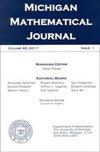稳定作用下稳定器的有效离散半径
IF 0.6
3区 数学
Q2 MATHEMATICS
引用次数: 2
摘要
我们证明了Kazhdan-Margulis定理推广到半单群在局部域上的平稳作用的一个有效变体:对于某些仅依赖于群的显式常数$\beta, \delta>0$,随机点的稳定器允许与单位元的一个小$r$邻域的非平凡交的概率不超过$\beta r^\delta$。这是一个关键的卷积不等式的结果。我们推导出在无穷远处消失的注入半径意味着体积的有限性。进一步的应用是离散平稳随机子群空间的紧性,并证明了半单群中的所有格都是弱紧的。本文章由计算机程序翻译,如有差异,请以英文原文为准。
Effective Discreteness Radius of Stabilizers for Stationary Actions
We prove an effective variant of the Kazhdan-Margulis theorem generalized to stationary actions of semisimple groups over local fields: the probability that the stabilizer of a random point admits a non-trivial intersection with a small $r$-neighborhood of the identity is at most $\beta r^\delta$ for some explicit constants $\beta, \delta>0$ depending only the group. This is a consequence of a key convolution inequality. We deduce that vanishing at infinity of injectivity radius implies finiteness of volume. Further applications are the compactness of the space of discrete stationary random subgroups and a novel proof of the fact that all lattices in semisimple groups are weakly cocompact.
求助全文
通过发布文献求助,成功后即可免费获取论文全文。
去求助
来源期刊
CiteScore
1.20
自引率
11.10%
发文量
50
审稿时长
>12 weeks
期刊介绍:
The Michigan Mathematical Journal is available electronically through the Project Euclid web site. The electronic version is available free to all paid subscribers. The Journal must receive from institutional subscribers a list of Internet Protocol Addresses in order for members of their institutions to have access to the online version of the Journal.

 求助内容:
求助内容: 应助结果提醒方式:
应助结果提醒方式:


